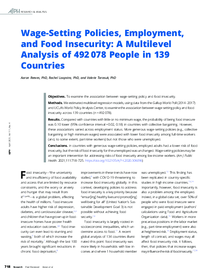Wage-setting policies, employment, and food insecurity: a multilevel analysis of 492 078 people in 139 countries

Reeves, Aaron ; Loopstra, Rachel ; Tarasuk, Valerie
American Journal of Public Health
2021
111
4
718-725
wage policy ; employment ; food security ; malnutrition ; wages
Wages and wage payment systems
http://dx.doi.org/10.2105/AJPH.2020.306096
English
Bibliogr.
"Objectives. To examine the association between wage-setting policy and food insecurity.
Methods. We estimated multilevel regression models, using data from the Gallup World Poll (2014–2017) and UCLA's World Policy Analysis Center, to examine the association between wage setting policy and food insecurity across 139 countries (n = 492 078).
Results. Compared with countries with little or no minimum wage, the probability of being food insecure was 0.10 lower (95% confidence interval = 0.02, 0.18) in countries with collective bargaining. However, these associations varied across employment status. More generous wage-setting policies (e.g., collective bargaining or high minimum wages) were associated with lower food insecurity among full-time workers (and, to some extent, part-time workers) but not those who were unemployed.
Conclusions. In countries with generous wage-setting policies, employed adults had a lower risk of food insecurity, but the risk of food insecurity for the unemployed was unchanged. Wage-setting policies may be an important intervention for addressing risks of food insecurity among low-income workers."
Digital
The ETUI is co-funded by the European Union. Views and opinions expressed are however those of the author(s) only and do not necessarily reflect those of the European Union or the ETUI.